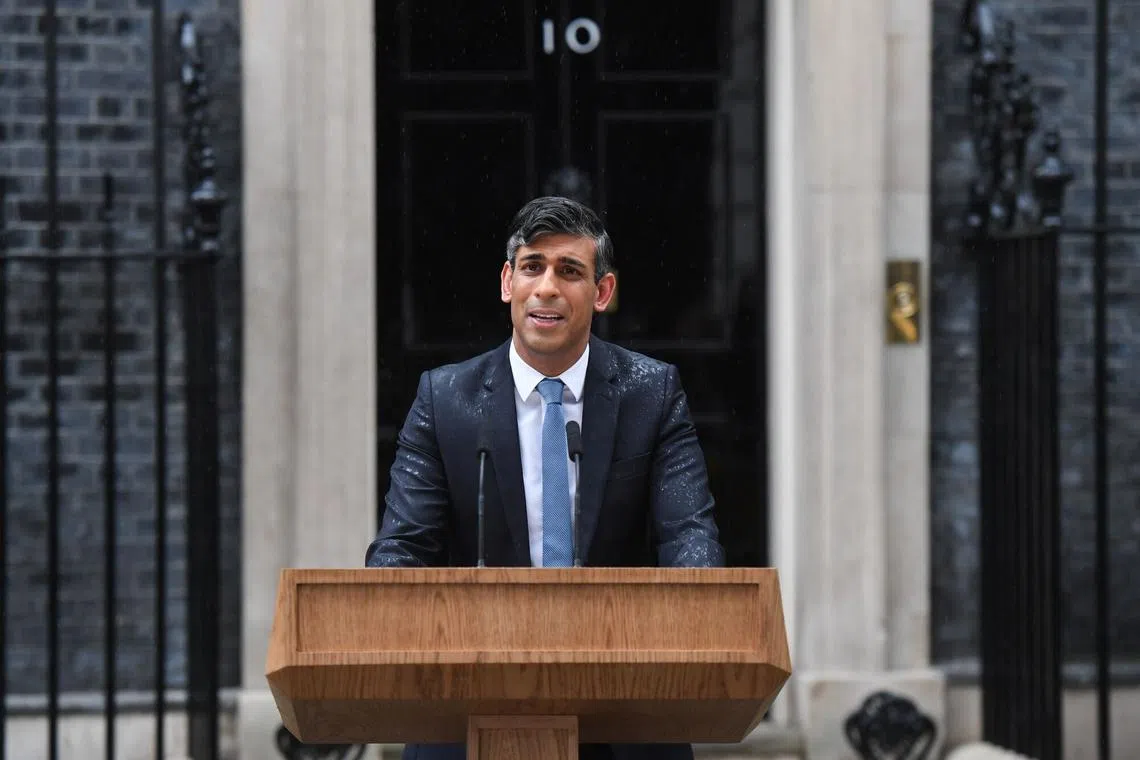British PM Sunak’s national service plan faces enforcement, funding questions
Sign up now: Get ST's newsletters delivered to your inbox

British PM Rishi Sunak’s campaign promise to revive national service for young Britons came under immediate scrutiny.
PHOTO: BLOOMBERG
LONDON – Prime Minister Rishi Sunak’s campaign promise to revive national service for young Britons came under immediate scrutiny over how the £2.5 billion (S$4.3 billion) plan would be funded and enforced.
While Mr Sunak captured the front pages of British newspapers with his surprise call to compel 18-year-olds into military or community service,
“There’s going to be no criminal sanctions. No one’s going to jail over this,” Mr Cleverly told Sky News on May 26. “We are going to compel people to do it,” he said, without elaborating on how.
Labour’s would-be chancellor of the exchequer, Ms Rachel Reeves, meanwhile, dismissed the idea as a “desperate” move, arguing that the programme would come at the expense of disadvantaged communities originally targeted by the funds. “It is just another example, I’m afraid, of a gimmick where the sums don’t add up,” Ms Reeves told the BBC, without saying where the party stood on the idea of compulsory national service.
The national service gambit marked the latest move by Mr Sunak to claw back support from the right-wing Reform UK party and demonstrate momentum in the polls ahead of the rare summer election. Mr Sunak had chosen the policy after internal polling showed that it could undermine the Reform vote, according to people familiar with his thinking.
The campaign has gotten off to a rocky start, with Mr Sunak drenched in the rain during his election announcement and drowned out by a protester blaring former Labour prime minister Tony Blair’s campaign anthem.
Many of Mr Sunak’s Cabinet members were kept in the dark on the plan until the final hours. Some had been expecting an autumn election that would have allowed the economy more time to improve.
Mr Sunak is hoping that if he cannot beat Labour leader Keir Starmer, he can at least save the Conservatives from a historic wipe-out, his allies have told Bloomberg.
The ruling party is losing support to Reform UK – founded by Brexit campaigner Nigel Farage – which could help Labour run up its tally of seats in the first general election since 2019.
Labour maintained its 22-point lead over the Conservatives in the first survey conducted by YouGov polling firm in the wake of Mr Sunak’s announcement, with the opposition party getting 44 per cent of support. Some 22 per cent said they supported the Tories, compared with 14 per cent for Reform, in the poll released on May 25.
Still, the survey of 2,072 adults found that 25 per cent viewed the Prime Minister favourably, up 5 percentage points from earlier in May. That compares with 34 per cent for Mr Starmer.
The national service mandate would require 18-year-olds to choose between either a full-time placement in the armed forces or cyber defence for one year, or volunteering in their community for the equivalent of one weekend per month for one year. A Royal Commission would be created to help launch applications for a pilot programme in September 2025 and introduce the mandate via a new National Service Act by the end of the next Parliament.
“This is a great country but generations of young people have not had the opportunities or experience they deserve, and there are forces trying to divide our society in this increasingly uncertain world,” Mr Sunak said in a statement on May 25.
The proposal would see the UK rejoin the ranks of countries that have similar mandatory national service programmes, including Israel, South Korea and Singapore. Britain last introduced mandatory national service in the years after World War II as the nation sought to manage its commitments overseas, eventually scrapping the plan in the 1960s.
The plan comes amid broad concern in security circles about Britain’s military readiness during what Defence Secretary Grant Shapps has called a “pre-war era”. The British Army has shrunk dramatically under Tory rule, to roughly 85,000 full-time personnel in 2023 from 110,000 in 2012.
Even as Mr Sunak pitched a plan that may alienate younger Britons, Mr Starmer reiterated Labour’s support for opening up the voting age to 16- and 17-year-olds at a campaign event on May 25, the Guardian reported.
The Conservative Party has said that £1 billion of the programme’s annual costs would be paid for with capital raised from a crackdown on tax avoidance and evasion. The remaining £1.5 billion would be paid for by extending the Shared Prosperity Fund set up with funds redirected from the EU after Brexit.
The fund was previously earmarked for spending on the Levelling-Up programme to develop disadvantaged communities, raising further questions about Mr Sunak’s commitment to a project central to former prime minister Boris Johnson’s successful campaign in 2019.
Mr Sunak caught one political break last week when Mr Farage announced that he would not run for a parliamentary seat under the Reform banner, something that might have made it easier for the upstart party to rally votes. During an appearance on Sky News on May 26, Mr Farage called the national service programme “a joke,” while acknowledging his ambition to supplant the Tories.
“I want to see the centre right of British politics completely reshaped,” he said. BLOOMBERG


